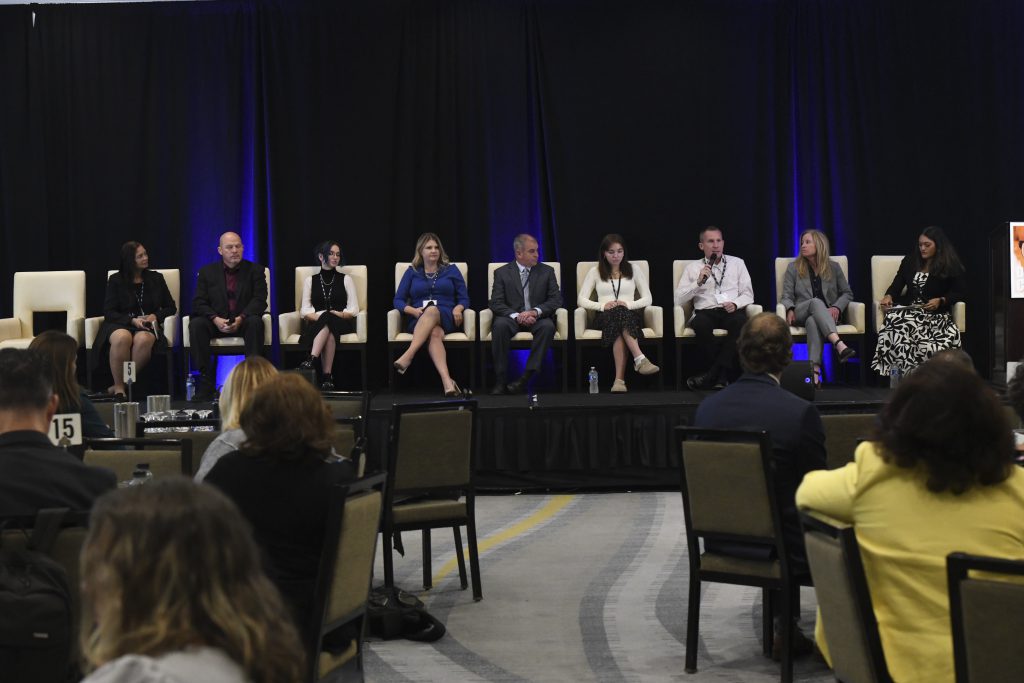
When New York State United Teachers (NYSUT) was considering its stance on cell phones in the classroom, the group called on the Bethlehem Central School District to lend its expertise on successful ways to create distraction-free schools.
Last week, NYSUT hosted a statewide conference to discuss the effects of cell phones and social media on students’ learning and mental health. More than 500 teachers, parents, students and policymakers, including Gov. Kathy Hochul, took part in the event in downtown Albany.
Bethlehem superintendent Jody Monroe, Board of Education president Holly Dellenbaugh, BCHS teacher David Rounds, and BCHS senior Lauren Dudgeon were featured speakers at the NYSUT Disconnected conference.
The district introduced locking Yondr pouches at the high school at the start of the 2023-24 school year. Phones and other personal electronic devices are not allowed at any BC school during the instructional day.
Board President Holly Dellenbaugh was part of the NYSUT conference opening session that included the governor, NYSUT president Melinda Person, and New York State Senate Education chair Shelley Mayer, among others.
“When our administrators first proposed a complete cell phone ban to the Board I fully supported it,” said Dellenbaugh. “I knew that the high school had previously tried restricting phone use in classrooms but those efforts didn’t seem to be enough to address the deeper issue of the negative impact of phones on social interactions, among our students during the day.
“I was secure in our Board’s unanimous decision to implement the policy and I believe it has proven successful,” Dellenbaugh told the audience.
Panel discussions followed the morning opener, providing attendees with opportunities to learn more about the nuts and bolts of making major policy changes. Superintendent Monroe, Mr. Rounds and student Lauren Dudgeon were part of a Q & A hosted by Katelyn Cordero, a reporter for Politico. In addition to BC, the panel included representatives from the Schoharie Central School District and New York City Schools.
Superintendent Monroe told the crowd that the decision to use Yondr pouches at the high school was not the first attempt to limit cell phone use at the school.
“We had policies before Yondr that were a little more lenient where we used the phone pockets that were hung on classroom walls,” said Monroe. “That policy ended up being enforced inconsistently. Now there’s zero tolerance in terms of cell phones being used anytime during the day whether it’s passing time, instruction, or at lunch.”
In the conversation, Rounds, a social studies teacher who is also president of the Bethlehem Central Teachers Association, admitted to being skeptical about the use of Yondr pouches at the high school before the policy was implemented.
“As president of the teacher’s union, I gave Superintendent Monroe 100 reasons why this policy would not work. And I’m so happy that I was wrong. I was 100% wrong,” Rounds told the audience. “It wasn’t as hard to implement as we thought it was going to be, efforts by support staff to enforce the policy have been outstanding and the best part of it is…the kids have changed.
“The first time I noticed it was making a difference was last fall when I heard a ruckus in the hallway and my reaction was, ‘oh no, there’s a problem in the hallway.’ So I ran out to the hall and the ruckus was kids laughing really hard,” said Rounds. “That was unusual and that shouldn’t be unusual.
“So then I started paying attention to it. I noticed how much louder the kids are in the hall, in the best of ways. I started to notice how much they were willing to have a conversation with me as a teacher before and after class.”
Dudgeon said she has seen the same, in herself and among her peers.
“It was an incredible change for me socially,” said Dudgeon. “I’m not afraid to go and have conversations with my teachers anymore. I’ve made bonds with the librarians. I made a lot of connections because I’m not hiding behind a screen.
“A lot of people were afraid of it (the policy) at first because we’re so addicted to these things,” added Dudgeon. “But it’s giving us a break. I don’t miss it and I’m really just focused on learning and I’m focused on my friends at school that I can just talk to with no phones in between us.”
Rounds, who teaches social studies at the high school, said one year into the new policy he is seeing signs of improvement in students’ well-being.
“I’m not a huge data guy. I have been in a classroom for 30 years. I know what I see,” said Rounds. “The level of anxiety has dropped since we put the ban in place. The biggest bit of anxiety the students often had was the fear of missing out. Without the phones, they realized they weren’t missing out on anything anymore and I think that was a huge shift in their own psychology. They needed the break and we provided it to them.”
